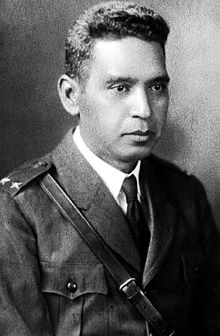Hernandez Martinez
| Maximiliano Hernández Martínez | |
|---|---|
 |
|
| 30th President of El Salvador | |
|
In office 2 December 1931 – 9 May 1944 |
|
| Preceded by | Arturo Araujo |
| Succeeded by | Andrés Ignacio Menéndez (served inbetween from 29 August 1934–1 March 1935) |
| Personal details | |
| Born |
October 20, 1882 San Matías, La Libertad, El Salvador |
| Died | May 15, 1966 (aged 83) Hacienda Jamastrán, Honduras |
| Political party | Partido Nacional Pro-Patria |
| Occupation | General |
Maximiliano Hernández Martínez (October 20, 1882 – May 15, 1966) was a 30th President of El Salvador from 1931 to 1944, leader of the World War II. While he served as President Arturo Araujo's vice-president and defense minister, a directorate seized power during a palace coup and afterwards named General Hernández Martínez president of El Salvador.
Hernández Martínez was born in San Matías, La Libertad. In the 1931 presidential election he was initially a candidate for his newly formed National Republican Party. He joined forces with Arturo Araujo of the Partido Laborista, running on a reformist platform. The ticket won the election, considered the first free multiparty election in Salvadoran history and the last for over half a century.
The reason for the coup was that military personnel had not been paid their salary, although it is sometimes attributed to the fall in prices of coffee abroad. The reality is that officers were not paid and the Finance Minister had paid only the police, who remained loyal to the president. The army officers were angry and ousted President Araujo.
Hernández Martínez led a military government that actively suppressed opposition, most notably the 1932 Salvadoran peasant massacre, where thousands of indigenous Salvadoran people were systematically murdered if they were suspected of collaboration with the Communists, led by Farabundo Martí. This massacre came to be known as La Matanza. The specific number of victims is unknown, but estimates range from 10,000 to 40,000 for the entire rebellion. American historian Thomas Anderson says there were no more than 10,000 killed. He does accept that the military killed people without a judgement and that they were usually killed by a firing squad after being compelled to dig their own graves. Usually they only needed to be Indian, usually male, from the town, and listed as voters of the Communist party in that town.
When Hernández Martínez raised the export tax in 1943 the weary distrust among oligarchic landowning elites over his modest land reform efforts and eccentric ways turned to conspiracy and opposition. He openly violated the constitution by declaring that he would serve a third term without holding elections.
...
Wikipedia
